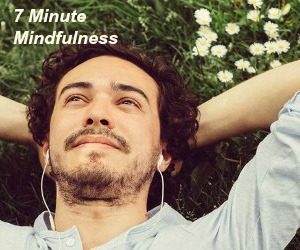Put the Brakes on Worrying
Do you worry? Are you a worry-wart? One major aspect of feeling stressed-out is worrying. The challenge is to recognize when the cause of your stress is worry, and the next step is to put the brakes on worrying to rid yourself of worry stress.
The dictionary definition of worrying is, “To torment oneself with or suffer from disturbing thoughts, fret.”

Goodbye Worries
Worried thoughts are negative or concerning and go around and around in your head. When worrying becomes excessive, it can trigger feelings of uneasiness, stress, anxiety, and even fearfulness.
We all worry at times. It’s natural to feel uneasy, worried, or the fight or flight syndrome when concerning issues arise. It’s normal to experience some anxiety as you work through problems to get to the solution. But if worried thoughts go unchecked, worrying can become the cause of unnecessary stress, high anxiety, and health issues.

Worrying All the Time
Does your level of stress and worry signal cause for concern? Is worrying beginning to take over your life?
If the feelings are overwhelming, excessive worrying can become generalized anxiety disorder or GAD. According to the Anxiety and Depression Association of American, ADDA, GAD is the most common anxiety disorder among older adults.
People coping with GAD can feel anxiety, worry, or fear about ‘multiple unrelated events’ on a consistent, daily basis. Harvard Health reports, “People with GAD constantly anticipate disaster and are overly concerned about issues like health, money, and family, even when there is no apparent reason for concern.”
Physical Effects of Worrying
Emotional stress due to chronic worry can ignite a series of health concerns. The culprit is stress hormones that are released during times of stress and anxiety. Hormones such as cortisol can boost blood sugar levels and blood fats. Major spikes in these hormones can cause unpleasant physical reactions, like headaches, stomachaches, irritability, rapid heartbeat, and rapid breathing.
Doctors have found that there is a tendency for people to ignore the physical effects of worrying and try to normalize feelings of worry and anxiety. But although it’s very common to ignore physical and emotional warnings, Dr. David Mischoulon, director of the Depression Clinical and Research Program at Massachusetts General Hospital says they should not be ignored. “… Left alone to manifest, GAD may lead to serious health problems, such as high blood pressure, depression, and addictive behavior like excessive drinking.”
If you are experiencing GAD, you are not alone. The ADDA says approximately 6.8 million adults experience GAD yearly. The exact cause of GAD hasn’t been pinpointed, but doctors have found evidence that biological links, family background, and stressful episodes all factor into the disorder.
Rid Yourself of Worry Stress
There are several treatments that can effectively help to overcome worrying or GAD. Supportive, interpersonal, and cognitive-behavioral treatments have been used to specifically target negative thoughts and the physical symptoms of excessive worry.
Confidence Coach, Dr. Aziz Gazipura has a view on how to stop worrying.
How To Stop Worrying | Dr. Aziz – Confidence Coach
https://SocialConfidenceCenter.com ============================================== 👉 GET MY BEST-SELLING E-BOOK FOR FREE! (A $17 VALUE!) “5 Steps To Unleash Y…
Tips to Stop Worrying
Be Conscious of Worrying – allot a specific amount of time to allow yourself to focus on problems or fears. Give them about 15 minutes of your time and then let them go.
Focus on Relaxation – Use a relaxation technique that really works for you. It could be a steam sauna, relaxing videos, aromatherapy, exercise or any number of ways that really relax you.
Breathe Deeply – Deep breathing is relaxing and can help release tension and anxiety. Release through breathing exercises and meditation.
Here are some tips to stop worrying from Dr. Oz. Stop Nighttime Worrying, Gabrielle Bernstein’s Trick to Stop Nighttime Worrying.
Home Remedies for Anxiety
Along with psychotherapy or medications to deal with anxiety, the Mayo Clinic offers this list of lifestyle and home remedies to get anxiety under control:
• Keep physically active. Develop a routine so that you’re physically active most days of the week. Exercise is a powerful stress reducer. It may improve your mood and help you stay healthy. Start out slowly and gradually increase the amount and intensity of your activities.
• Make sleep a priority. Do what you can to make sure you’re getting enough sleep to feel rested. If you aren’t sleeping well, see your doctor.
• Use relaxation techniques. Visualization techniques, meditation, and yoga are examples of relaxation techniques that can ease anxiety.
• Eat healthy, Healthy eating — such as focusing on vegetables, fruits, whole grains, and fish — may be linked to reduced anxiety, but more research is needed.
• Avoid alcohol and recreational drugs. These substances can worsen anxiety.
• Quit smoking and cut back or quit drinking coffee. Both nicotine and caffeine can worsen anxiety.
Some people believe ‘worrying prevents bad things from happening,’ and view the behavior as a form of protection. They think worrying is helpful and they can’t give it up or things will get out of control.
Remember worrying is not a way to keep problems under control and it is not protection from ‘bad things happening.’ Worrying is the ‘bad thing.’ Put the brakes on worrying.
To Your Health!












